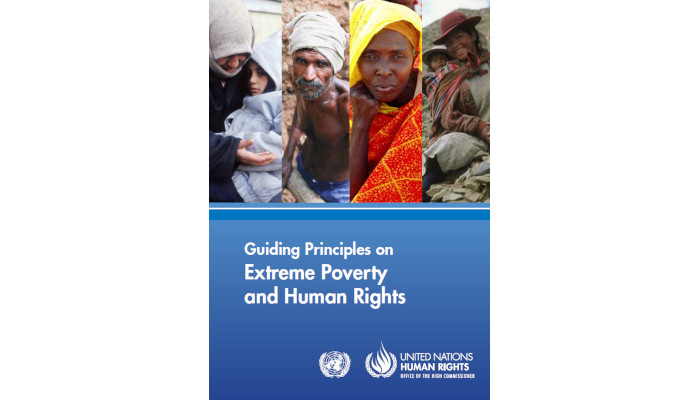Guiding Principles on Extreme Poverty and Human Rights

On 27th September, the UN Human Rights Council adopted by consensus the Guiding Principles on Extreme Poverty and Human Rights. Through its adoption, member states of the Human Rights Council affirmed that eradicating extreme poverty is not only a moral duty but also a legal obligation under existing international human rights law.
The adoption Guiding Principles on Extreme Poverty and Human Rights was timely, given the inaugural meeting of the UN Secretary-General’s High-Level Panel of Eminent Persons on the Post-2015 Development Agenda. It is imperative that the High-Level Panel draw on tools such as the Guiding Principles to ensure their recommendations regarding the vision and shape of a Post-2015 development agenda lead to the full realization of human rights for all.
Objectives
The objective of the Guiding Principles is to provide guidance on how to apply human rights standards in efforts to combat poverty. The Guiding Principles are a tool for designing and implementing poverty reduction and eradication policies, and as a guide to how to respect, protect and fulfill the rights of persons living in extreme poverty in all areas of public policy. They are global in scope, recognizing that extreme poverty is a phenomenon which affects all countries.
ATD Fourth World initially called on the United Nations to consider extreme poverty itself as a violation of human rights in 1982, collecting 300,000 signatures that were delivered to the then Secretary-General. With the support of leading human rights experts, committed governments, and other human rights NGOs, this eventually led to the Human Rights Council’s predecessor body deciding that a rights-based approach to the fight against poverty would be a powerful tool in the eradication of extreme poverty. The Council then mandated the Special rapporteur on Extreme Poverty and Human Rights, Magdalena Sepúlveda, to finalize the Guiding Principles for their adoption during the current Council session.
Effectively claim rights
Through its long-term grassroots presence and action alongside the most marginalized populations, ATD Fourth World has understood that the first step in moving out of poverty and exclusion is when people can effectively claim their rights. The Guiding Principles draw on existing international agreed human rights norms and principles that States have already signed up to, such as the Universal Declaration on Human Rights or the International Convention on the Rights of the Child. Yet too often an implementation gap exists between countries signing up to guaranteeing a right – to health, education or participation in decisionmaking – and their effective realization by their most marginalized citizens. The consequence of this is evident, for example, in efforts to achieve the MDGs falling short for many millions of the poorest people.
Commenting on their imminent adoption, Matt Davies, head of international policy and advocacy at ATD Fourth World said,
“With these Guiding Principles on Extreme Poverty and Human Rights, we have a tool which identifies the obstacles people in extreme poverty face in benefiting from anti-poverty policies and services, and importantly, guidelines on how to address this situation. We call on those directly involved in discussions on developing the post-2015 agenda, including the High Level Panel, to draw on the content of these Guiding Principles to develop recommendations that will ensure nobody is left behind by the successor framework to the MDGs.”

